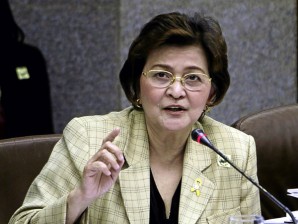Why should a charity agency be engaged in the production of thermal paper?
Philippine Charity Sweepstakes Office Chairperson Margarita Juico on Monday posed this question as she defended the PCSO board’s decision to scrap a joint venture with an Australian firm to build a thermal paper plant.
“While the PCSO does not turn its back on its commitments, the terms of the joint venture were not within the PCSO’s corporate purpose and mandate, and were grossly prejudicial to the interests of PCSO,” Juico said in a statement.
Juico pointed out that the charity agency was merely adhering to a Senate blue ribbon committee report that suggested it cancel its joint venture with TMA Australia and hale to court the previous PCSO board for graft and corrupt practices.
The former PCSO board, led by then General Manager Rosario Uriarte, had entered into an agreement with TMA Group of Companies Pty. Ltd. in 2009 to put up a thermal coating plant that would produce and sell thermal paper and related products in local and international markets.
To support its initial operation, the agreement stated that the PCSO would buy its thermal paper requirements from TMA for 50 years. The charity office needs thermal paper to print the lottery tickets sold at outlets nationwide.
Violation of antigraft law
In 2011, the Senate blue ribbon committee discovered that the Uriarte-led PCSO board appeared to have violated the antigraft law and recommended the immediate cancelation of the joint venture.
“The PCSO acted upon the findings and recommendations of the Senate blue ribbon committee when it canceled the contract with TMA,” Juico said.
With the charity agency bound to TMA for its thermal paper supply for 50 years, this stipulation skirted provisions of the law on government procurement, the PCSO chairperson said.
Citing an analysis of the agency’s legal team, Juico explained that the assailed portion of the contract was a mere “supply contract disguised as a joint venture agreement designed to evade” provisions of the law.
Ultimately, it placed the public interest at a disadvantage because the supply resulted in a monopoly, she added.
Provide medical assistance
The PCSO chair pointed out that the agency’s mandate was expressly limited to providing medical assistance to indigent patients and to support charities.
To fulfill this, the charity office generates revenue through the nationwide lottery and other games of chance.
